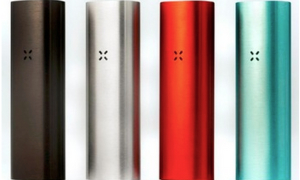 Pax Labs, the U.S. heat-not-burn manufacturer previously known as Ploom, today launches a new generation of its namesake device which it is positioning as “the most intelligent, premium and highest performing vaporizer in the market”.
Pax Labs, the U.S. heat-not-burn manufacturer previously known as Ploom, today launches a new generation of its namesake device which it is positioning as “the most intelligent, premium and highest performing vaporizer in the market”.
Selling at $279.99, the Pax 2 is 25 percent smaller, with 30 percent longer usage time between recharges.
Like its predecessor, which the company claims has sold 500,000 units, it is designed to heat loose-leaf tobacco.
It offers the user four temperature settings along with self-optimising temperature and power, and an auto-cooling function. Motion- and lip-detection systems sense when the product is being used and adjust heating accordingly.
The Pax 2 will be available through retailers or online from Pax itself.
“Our connection to Silicon Valley is evident in our designing Pax 2 – addressing customer feedback, integrating hardware and software, and delighting users. We’ve even included hidden features, functionality and games into our LED interface,” said co-founder James Monsees.
Nine-year-old Pax – or Ploom, as it then was – and its investor Japan Tobacco International (JTI) said last month that they would end their relationship and divide products between them.
JTI took over the ModelTwo heat-not-burn vaporiser, which uses tobacco in pods, as well as the Ploom name.
The San Francisco company founded by Monsees and Adam Bowen retained rights to the Pax product, changed its name to Pax Labs, and agreed to buy back JTI’s minority stake.
The previous Pax product will remain available, and has already been reduced from $250 to $200.
What This Means: With its price point, presentation and gadgetry, Pax appears to be imagining itself as the Apple of heat-not-burn. At a first glance the Pax 2 may not be quite the radical innovation that earlier hints of the company’s plans had promised, but its slickness will appeal to many consumers.
The regulatory direction of heat-not-burn remains unclear. The U.S. Food and Drug Administration (FDA) wants to bring “novel non-combustible tobacco products” such as this into its ambit via the proposed deeming regulations which it issued nearly a year ago, and that would likely impose tough compliance requirements for manufacturers, though the details are as yet apparently undecided.
But Pax – like Philip Morris International (PMI) with iQOS and R.J. Reynolds with Revo – is clearly betting that the technology has a future. And it may also be significant that an early glimpse of the product appears to have been granted by Pax to The Cannabist, a publication of the respected Denver Post newspaper which specialises in covering alternatives to conventional tobacco smoking.
– Barnaby Page ECigIntelligence staff






